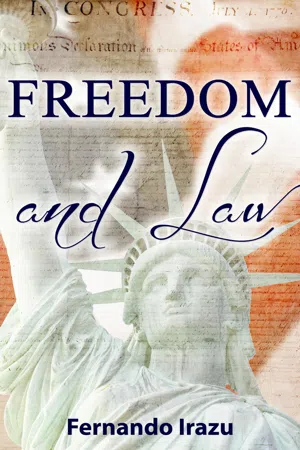
- English
- ePUB (mobile friendly)
- Available on iOS & Android
Freedom and Law
About this book
"Freedom and Law" addresses a variety of issues posed by the rule of law, in the context of Christianity and our Western civilization, as lived within the republican system of government with democratic participation in America.In particular, this work embarks on conceptual issues dealing with human nature, morality, justice, law, rights, especially the right to privacy, equality and discrimination, as well as "identity politics" and related topics from the perspective of the system of government established in the US constitution by the Founding Fathers.
At this juncture, it also elaborates on the political dynamics embroiling the Supreme Court of Justice vis a vis the other two branches of government as to the prior, and, while cherishing the foundations of America, it puts forward a vision that coherently protects human freedom in the widest array of human activities.
"Freedom and Law" is a call for human freedom at the personal, communitarian and countrywide levels, always geared at the better horizons offered by human nature.
Fernando Irazu is an attorney licensed to practice law in the State of New York and before the US Supreme Court of Justice.He pursued his studies at Harvard Law School and the Argentinean Catholic University.Some of his interests include comparative constitutional law and political institutions, philosophy and anthropology, as well as theology.He has practiced law with both English and US law firms in New York City, and worked as an investment banker with different top-tier financial institutions.For almost thirty years he has lived in Connecticut and New York City, where his three beloved children were born and raised.
Keywords
Freedom, law, justice, human nature, natural law, virtue, virtuosity, personhood, rights, Supreme Court, democracy, Ten Commandments, right to privacy, constitution, constitutional law, philosophy, anthropology, metaphysics, theology, Christianity, Western civilization, United States.
Frequently asked questions
- Essential is ideal for learners and professionals who enjoy exploring a wide range of subjects. Access the Essential Library with 800,000+ trusted titles and best-sellers across business, personal growth, and the humanities. Includes unlimited reading time and Standard Read Aloud voice.
- Complete: Perfect for advanced learners and researchers needing full, unrestricted access. Unlock 1.4M+ books across hundreds of subjects, including academic and specialized titles. The Complete Plan also includes advanced features like Premium Read Aloud and Research Assistant.
Please note we cannot support devices running on iOS 13 and Android 7 or earlier. Learn more about using the app.
Information
Endnotes
Table of contents
- Preface
- Introduction: A New Reality Excluding Morality
- Law, Justice and Rational Freewill: A Surreal Conceptual Discussion of Real Magnitude
- Human Dignity and the Rule of Law: Practical Dimension, Civility, Empathy, And Cultural Differences
- Nature, Transcendence and Virtuosity: Self-Autonomy and The Ten Commandments
- The New Man and The State: Privacy as Well As Legislative and Judicial Activity
- The American Way for The Future
- Corollary: The Return to Innocence with Strong Local Belongings
- About the Author
- Bibliography, Sources, And Jurisprudence in Order of Appearance
- Endnotes